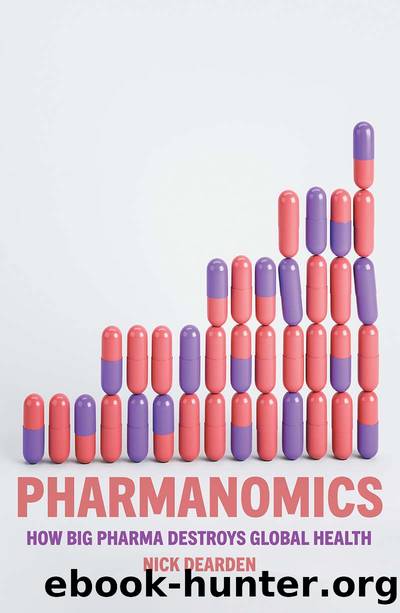Pharmanomics by Nick Dearden

Author:Nick Dearden
Language: eng
Format: epub
Publisher: Verso
5
Recolonising the Global Economy
At the heart of Big Pharmaâs power lie its monopolies, which are based on a set of intellectual property rules. These rules have underscored Big Pharmaâs transformation from a useful industry that researches important medicines into the financialised sector we see today. The story of how these rules came into being is important, because it explains so much about the nature of the global economy as a whole, and how big business came to have such enormous power over our lives. Few activists in the Peopleâs Vaccine movement understand these intellectual property rules as well as Tahir Amin.
Amin could have made a lot of money from his 1990s legal training, centred on intellectual property, if his conscience had not led him down a different path. Amin is proud of his working-class background, and living for fifteen years in New York does not seem to have made much of a dent in his Yorkshire accent. I met him in perhaps Londonâs most famous bookshop, Foyles, and we reminisced about studying in the city in the 1990s.1 Back then, Foyles was a ramshackle place with countless small rooms, corridors and staircases, run by the eccentric and reputedly autocratic Christina Foyle. You could spend days getting lost in there, because books were arranged by publisher with no electronic database. Finding the book you needed was a matter of pure luck. On the other hand, finding a multitude of books that deeply interested you as you tried to locate what you needed was guaranteed. Today, the shop is a neat and spacious place. Itâs a lot less fun, but you can find what you are looking for with ease.
To me it feels like a metaphor for London itself, which has lost so much of what made it unique and interesting, though it has certainly become an easier city to live in for those with a high enough income. The liberalisation of the City of London in the 1980s and â90s created incredible wealth, London becoming the pre-eminent home of the greed-is-good âYuppieâ class. But it was also the home of some of the biggest ecstasy-fuelled rave clubs in the world, of squat culture, and of enormous, creative demonstrations against the rapid gentrification of the city.
It was a city at a crossroads. Margaret Thatcher had gone, but her legacy was all around us. Before Thatcher, Britain was one of the most equal and left-leaning countries in Europe. This was anathema to Thatcher, who famously insisted, âThere is no such thing as society.â The vision which drove Thatcher on, a set of ideas which would congeal into something called neoliberalism, would affect not only Britain but the entire global economy. These neoliberal ideas were at the heart of the reshaping the pharmaceutical industry into the beast that I was discussing with Amin.
But in the early nineties, when Amin and I were studying, the implications of all of this for the rest of the world were not so obvious. As a student activist, I was interested in domestic struggles, such as opposing privatisation and Britainâs far right.
Download
This site does not store any files on its server. We only index and link to content provided by other sites. Please contact the content providers to delete copyright contents if any and email us, we'll remove relevant links or contents immediately.
Life 3.0: Being Human in the Age of Artificial Intelligence by Tegmark Max(4522)
The Sports Rules Book by Human Kinetics(3597)
ACT Math For Dummies by Zegarelli Mark(3568)
The Age of Surveillance Capitalism by Shoshana Zuboff(3433)
Blood, Sweat, and Pixels by Jason Schreier(3140)
Unlabel: Selling You Without Selling Out by Marc Ecko(2990)
Urban Outlaw by Magnus Walker(2953)
Hidden Persuasion: 33 psychological influence techniques in advertising by Marc Andrews & Matthijs van Leeuwen & Rick van Baaren(2792)
The Pixar Touch by David A. Price(2745)
Bad Pharma by Ben Goldacre(2737)
Project Animal Farm: An Accidental Journey into the Secret World of Farming and the Truth About Our Food by Sonia Faruqi(2668)
Brotopia by Emily Chang(2596)
The Content Trap by Bharat Anand(2499)
Slugfest by Reed Tucker(2425)
The Airbnb Story by Leigh Gallagher(2380)
Kitchen confidential by Anthony Bourdain(2323)
Coffee for One by KJ Fallon(2019)
Smuggler's Cove: Exotic Cocktails, Rum, and the Cult of Tiki by Martin Cate & Rebecca Cate(1996)
Beer is proof God loves us by Charles W. Bamforth(1937)
